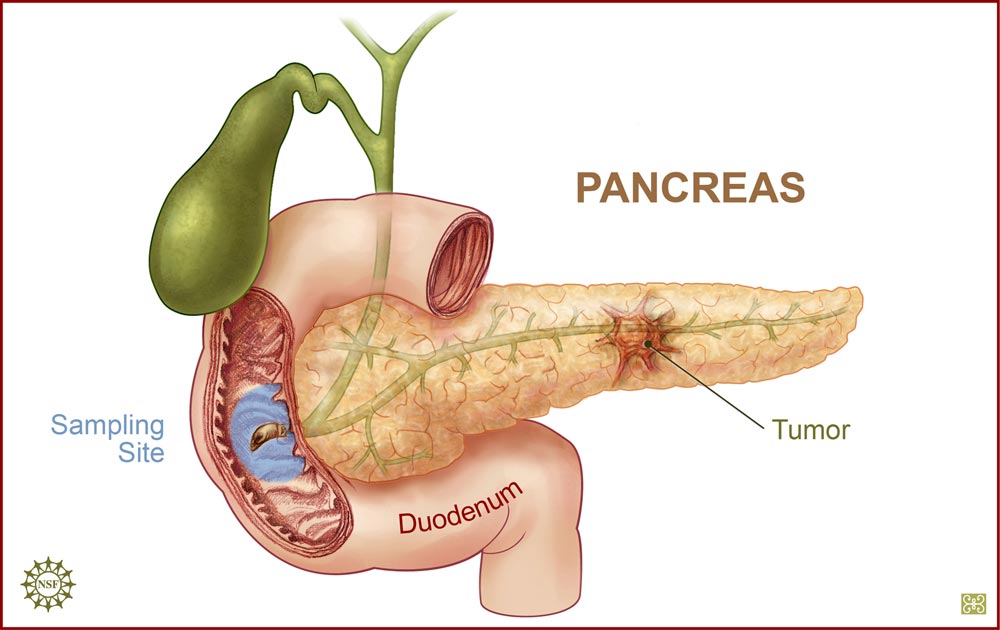
Pancreatic Cancer – Pancreatic Cancer: causes, Symptoms, Treatment, and Prevention
Pancreatic cancer: Malignancy of the pancreas. Pancreatic cancer has been called a “silent” disease because early pancreatic cancer usually does not cause symptoms. if the tumor blocks the common bile duct and bile cannot pass into the digestive system, the skin and whites of the eyes may become yellow (jaundiced), and the urine darker as a result of accumulated bile pigment called bilirubin.
Pancreatic Cancer Causes
The exact as to what damages DNA in the vast majority of cases of pancreatic cancer is not clear. In other words the exact pancreatic cancer causes are not clear. But it is known that a small percentage of people develop the disease as a result of a genetic predisposition. These people who have a close relative, such as a parent or sibling, with pancreatic cancer have a higher risk of developing pancreatic cancer themselves.
Age: is also a factor to be considered which increases the incidence of the disease. As age increases the probability of pancreatic cancer also increases. The incidence of Pancreatic Cancer is relatively low in individuals up to age 50, after which it increases significantly. The age group 65 – 79 has the highest incidence of Pancreatic Cancer.
Pancreatic Cancer Symptoms
In many cases, pancreatic cancer symptoms do not occur until the advanced stages. When pancreatic cancer symptoms do occur, they are often ignored because they are so vague and nonspecific. The first pancreatic cancer symptoms are usually pain in the abdomen and weight loss. Additional pancreatic cancer symptoms to look for include jaundice, fatigue, dizziness, weakness, diarrhea, chills, and muscle spasms.
Many of these pancreatic cancer symptoms are the result of a less serious ailment. However, only a doctor can accurately diagnosis whether or not your pancreatic cancer symptoms are the result of cancer.
Pancreatic cancer can cause pain and discomfort in your upper abdomen, which sometimes spreads to your back. at first, the pain may come and go, but as the cancer becomes larger, and more advanced, you may find that the pain is more constant, and lasts for longer.
The pain pancreatic cancer causes is often worse when you are lying down or eating. This type of pain tends to affect people whose tumour has formed in either the body or tail of the pancreas.
Pancreatic Cancer Treatment:
This cancer is difficult to diagnose because there are no symptoms in the early stages and because , when symptoms appear, they match other diseases. Depending on the stage and location of the cancer, surgery, chemotherapy and/or radiation therapy may be used. if the cancer has not spread beyond the pancreas, therapy can be successful, but, as stated earlier, it’s very unlikely to find pancreatic cancer in the early stages. In later stages, often the therapy concentrates on the comfort of the patient.
Obstruction of bile flow may be temporarily relieved by placement of a tube (stent) in the lower portion of the duct that drains bile from the liver and gallbladder. In most cases, however, the tumor eventually obstructs the duct above and below the stent. an alternative treatment method is the surgical creation of a channel that bypasses the obstruction. for example, an obstruction of the small intestine can be bypassed by a channel that connects the stomach with a portion of the small intestine that is beyond the obstruction.
Pancreatic cancer is the fourth leading cause of cancer deaths in the US, but receives extremely little federal funding to support research efforts. Dr. Randy Pausch, the Carnegie Mellon professor who has pancreatic cancer, has joined efforts with the Pancreatic Cancer Action Network to urge the federal government to provide critical funding to speed the cure for this horrible disease.
More : Pancreatic Cancer